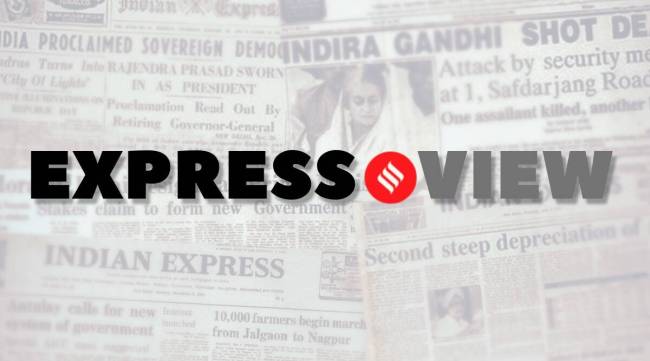Opinion Controversy over an Iqbal song in a UP school and how these culture wars impoverish us all
The government machinery seems to take a cue from the power corridors and acts with alacrity in favour of the majoritarian sentiment when such controversies erupt. In the process, in Karnataka as in UP, the cultural life of the common people is getting restricted and impoverished.
 Iqbal, the author of Sare jahan se achha Hindustan hamara, is a leading light in the shared heritage of the Subcontinent.
Iqbal, the author of Sare jahan se achha Hindustan hamara, is a leading light in the shared heritage of the Subcontinent. A school principal and a shiksha mitra in Uttar Pradesh are the latest victims of an ongoing culture war in the state. These two staff members of a government school in Bareilly were suspended by the state education department on Wednesday and an FIR filed against them for “hurting religious sentiments” after a Vishwa Hindu Parishad activist filed a complaint against them. According to the FIR, a prayer song written by Allama Iqbal and recited by students in the school assembly “hurt the sentiments of the Hindus” and the teachers involved in the recital were “preparing the students for conversion”. The 1902 song, “Lab pe aati hai dua”, is recited in morning assemblies in hundreds of schools that follow secular curricula. The complainant, according to the FIR, was upset with the last two lines of the song — “Mere allah burai se bachana mujhko/ Nek jo rah ho, ussi rah pe chalana mujhko” (O Lord, protect me from evil/ Guide me to the path that leads to the good). The complaint and the administrative action taken on it — by the police and education departments respectively — is deeply disturbing. It reveals a wilful cultural ignorance and deepening social polarisation that, going ahead, could have an increasingly chilling effect in the teaching and learning of poetry and literature.
Iqbal, the author of Sare jahan se achha Hindustan hamara, is a leading light in the shared heritage of the Subcontinent. Like many poets, his poetic idiom has been shaped also by his faith and related cultural traditions. In fact, religious texts and epics are the fount of much of the literatures in India; any learning of Indian language and literature involves engagement with writers such as Tulsidas, Kambar, Basava, Thunchathu Ezhuthachan, Jnaneswar, Tukaram. In the case of a modern poet like Iqbal and the song in question, the words have to be read within the larger context of the text rather than in isolation and ascribed a broader meaning instead of confining it within a religious idiom.
Karnataka, which is acquiring a reputation for being the laboratory of Hindutva politics in the South, is also being roiled by a debilitating and polarising politics and policy which gathers around personal choices such as dress and food — the attempts to ban hijab in educational institutions, for instance, or the sale of halal meat. The government machinery seems to take a cue from the power corridors and acts with alacrity in favour of the majoritarian sentiment when such controversies erupt. In the process, in Karnataka as in UP, the cultural life of the common people is getting restricted and impoverished.






